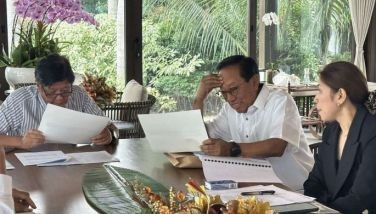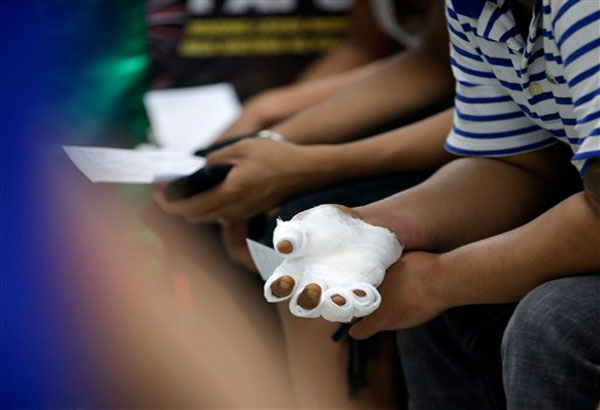‘Protect public from dubious opinion polls’
February 29, 2004 | 12:00am
An official of the National Statistical Coordination Board (NSCB) called on the Philippine Statistical Association (PSA) yesterday to protect the public from unsound election surveys and illegitimate pollsters.
The PSA "should take a more responsive role in protecting the public from these polls, which... have truly become weapons of mass distraction," Dr. Romulo Virola, NSCB secretary-general, said in an article posted on the board’s website, nscb.gov.ph.
He said the PSA, being the country’s one and only association of statistical professionals, "is in the best position to provide expert advice on how the public should manage poll results released by various sources."
The PSA, whose current president is Dr. Jose Ramon Albert, previously discussed an accreditation process wherein the association will maintain a list of accredited pollsters, Virola said.
"Unfortunately, a decision was made not to push the idea," he added.
Virola, in a telephone interview, told The STAR that after he posted his article on the NSCB website, Albert e-mailed him, saying the PSA board has yet to discuss the matter seriously.
He also said that some pollsters, particularly Social Weather Stations (SWS) president Mahar Mangahas, are not too keen on what they perceive as the "regulation" of pollsters.
Viola explained that if a poll firm is accredited by the PSA, it means that it used sound methodology and valid tools in its surveys.
"It’s not the same as regulation" since unaccredited poll firms are not prevented from coming up with their own surveys, he said.
Virola noted that the SWS, Pulse Asia, and Krystal Research Association have convincingly successful track records in predicting election results.
But he said while some surveys have been properly designed, "there are those that malign the statistical profession and desecrate statistics to the realm of lies and damned lies."
Virola said election polls and pollsters have failed the public many times in the past, for two major reasons: unsound methodology and the deliberate intent to release to the public fabricated or pre-determined outcomes.
He cited the Literary Digest’s failure to predict the results of the 1936 United States presidential election due to unsound methodology — they sent out 10 million ballots to its subscribers, most of who were telephone and automobile owners. On the basis of 2.3 million returned ballots, it predicted that Alfred Landon would win over Franklin Delano Roosevelt.
"In the four previous elections, the Literary Digest had predicted accurately the winner using the same approach; but in the post-Depression 1936, there was a high correlation between income and party preference, which was not there in the previous elections," Virola said.
Gallup, another US poll firm, correctly predicted Roosevelt as the winner.
He said the NSCB has instituted a Statistical Survey Review and Clearance System to evaluate the technical aspects of proposed surveys or censuses to be conducted by or for government agencies, including government-owned or controlled corporations.
Virola, however, stressed that surveys conducted by the private sector do not fall under this system.
He also warned that the use of sound methodologies by the best statisticians does not guarantee 100 percent success.
"Random errors, which are a necessary component of statistical surveys in contract to complete enumeration of respondents or censuses, will contribute a certain frequency of failure, the extent of which can be scientifically estimated," Virola said.
Illegitimate pollsters
Virola refused to name "illegitimate" pollsters, but said most of these firms do not allow others to study the methodology they used in their surveys.
"It’s an indication that their survey is not systematic," Virola said.
He said that when he was PSA president, he wanted to come out with advertisements in several newspapers to tell people how to understand and evaluate election surveys for themselves.
Virola said that respondents to an election survey can be less than 2,000 but should cover "the entire kaleidoscope of voters." He added that pollsters should be wary of including respondents who have a history of not voting.
Some poll firms can also influence the results of an election survey — inadvertently or otherwise — through the questions they ask respondents, he said.
Virola explained that there have been incidents wherein respondents were asked if they would vote for a particular candidate after they were "conditioned" by the researcher who cited negative or positive feedback on the candidate.
"The way a question is phrased" can swing the results of a survey, he said.
Virola noted that in some commissioned surveys, the ones who commissioned the survey can influence its results through the framing of the question.
"If a pollster is not very professional, the survey can be influenced by the one paying for the survey," he said.
Virola also cited another notion "promoted" by the pollsters themselves. In the latest Pulse Asia survey, President Arroyo got a 31.9 percent rating to movie actor Fernando Poe Jr.’s 31.7 percent.
He explained that Mrs. Arroyo’s "lead" is actually a tie and "can go either way" on the May 10 elections, depending on the three-percent margin of error and the number of undecided respondents.
Virola also noted that in Mexico, a law prohibits pollsters from conducting surveys too near the date of the elections, "premised on the assumption that the surveys can influence voters, particularly those who are undecided."
The PSA board has not yet discussed the possibility of having a similar law in the Philippines, Virola said, but added that some members say this law may infringe on the right to free expression.
The PSA "should take a more responsive role in protecting the public from these polls, which... have truly become weapons of mass distraction," Dr. Romulo Virola, NSCB secretary-general, said in an article posted on the board’s website, nscb.gov.ph.
He said the PSA, being the country’s one and only association of statistical professionals, "is in the best position to provide expert advice on how the public should manage poll results released by various sources."
The PSA, whose current president is Dr. Jose Ramon Albert, previously discussed an accreditation process wherein the association will maintain a list of accredited pollsters, Virola said.
"Unfortunately, a decision was made not to push the idea," he added.
Virola, in a telephone interview, told The STAR that after he posted his article on the NSCB website, Albert e-mailed him, saying the PSA board has yet to discuss the matter seriously.
He also said that some pollsters, particularly Social Weather Stations (SWS) president Mahar Mangahas, are not too keen on what they perceive as the "regulation" of pollsters.
Viola explained that if a poll firm is accredited by the PSA, it means that it used sound methodology and valid tools in its surveys.
"It’s not the same as regulation" since unaccredited poll firms are not prevented from coming up with their own surveys, he said.
Virola noted that the SWS, Pulse Asia, and Krystal Research Association have convincingly successful track records in predicting election results.
But he said while some surveys have been properly designed, "there are those that malign the statistical profession and desecrate statistics to the realm of lies and damned lies."
Virola said election polls and pollsters have failed the public many times in the past, for two major reasons: unsound methodology and the deliberate intent to release to the public fabricated or pre-determined outcomes.
He cited the Literary Digest’s failure to predict the results of the 1936 United States presidential election due to unsound methodology — they sent out 10 million ballots to its subscribers, most of who were telephone and automobile owners. On the basis of 2.3 million returned ballots, it predicted that Alfred Landon would win over Franklin Delano Roosevelt.
"In the four previous elections, the Literary Digest had predicted accurately the winner using the same approach; but in the post-Depression 1936, there was a high correlation between income and party preference, which was not there in the previous elections," Virola said.
Gallup, another US poll firm, correctly predicted Roosevelt as the winner.
He said the NSCB has instituted a Statistical Survey Review and Clearance System to evaluate the technical aspects of proposed surveys or censuses to be conducted by or for government agencies, including government-owned or controlled corporations.
Virola, however, stressed that surveys conducted by the private sector do not fall under this system.
He also warned that the use of sound methodologies by the best statisticians does not guarantee 100 percent success.
"Random errors, which are a necessary component of statistical surveys in contract to complete enumeration of respondents or censuses, will contribute a certain frequency of failure, the extent of which can be scientifically estimated," Virola said.
Illegitimate pollsters
Virola refused to name "illegitimate" pollsters, but said most of these firms do not allow others to study the methodology they used in their surveys.
"It’s an indication that their survey is not systematic," Virola said.
He said that when he was PSA president, he wanted to come out with advertisements in several newspapers to tell people how to understand and evaluate election surveys for themselves.
Virola said that respondents to an election survey can be less than 2,000 but should cover "the entire kaleidoscope of voters." He added that pollsters should be wary of including respondents who have a history of not voting.
Some poll firms can also influence the results of an election survey — inadvertently or otherwise — through the questions they ask respondents, he said.
Virola explained that there have been incidents wherein respondents were asked if they would vote for a particular candidate after they were "conditioned" by the researcher who cited negative or positive feedback on the candidate.
"The way a question is phrased" can swing the results of a survey, he said.
Virola noted that in some commissioned surveys, the ones who commissioned the survey can influence its results through the framing of the question.
"If a pollster is not very professional, the survey can be influenced by the one paying for the survey," he said.
Virola also cited another notion "promoted" by the pollsters themselves. In the latest Pulse Asia survey, President Arroyo got a 31.9 percent rating to movie actor Fernando Poe Jr.’s 31.7 percent.
He explained that Mrs. Arroyo’s "lead" is actually a tie and "can go either way" on the May 10 elections, depending on the three-percent margin of error and the number of undecided respondents.
Virola also noted that in Mexico, a law prohibits pollsters from conducting surveys too near the date of the elections, "premised on the assumption that the surveys can influence voters, particularly those who are undecided."
The PSA board has not yet discussed the possibility of having a similar law in the Philippines, Virola said, but added that some members say this law may infringe on the right to free expression.
BrandSpace Articles
<
>
- Latest
- Trending
Trending
Latest
Trending
Latest
Recommended






























